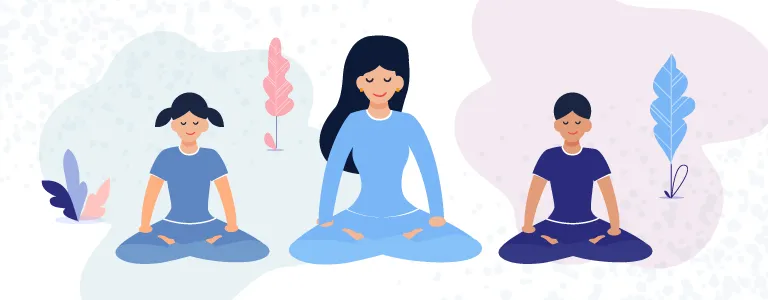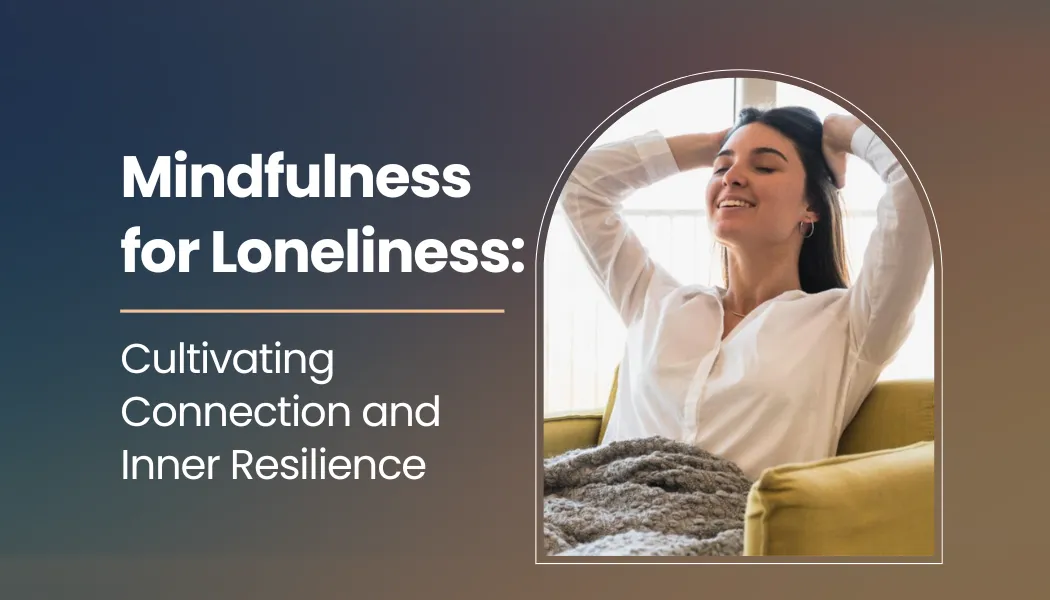Mindfulness for Loneliness: Cultivating Connection and Inner Resilience
Loneliness and social isolation have become pervasive challenges in today’s world. Despite digital connectivity, many people feel emotionally disconnected, craving genuine human connection. Loneliness is more than an emotional discomfort; it can impact mental, emotional, and physical health, contributing to anxiety, depression, sleep disturbances, and even cardiovascular issues.
Loneliness and social isolation have become pervasive challenges in today’s world. Despite digital connectivity, many people feel emotionally disconnected, craving genuine human connection. Loneliness is more than an emotional discomfort; it can impact mental, emotional, and physical health, contributing to anxiety, depression, sleep disturbances, and even cardiovascular issues.
Mindfulness, the practice of present-moment awareness without judgment, offers a path to alleviate loneliness and strengthen inner resilience. By cultivating a mindful approach to thoughts, emotions, and social interactions, you can foster self-compassion, improve emotional regulation, and even enhance the quality of your connections with others.
This article explores how mindfulness addresses loneliness, the neuroscience behind it, and practical techniques to integrate into daily life.
Table of contents
- 1. The Nature of Loneliness
- 2. How Mindfulness Helps with Loneliness
- 3. The Neuroscience of Mindfulness and Social Connection
- 4. Mindfulness Practices for Loneliness
- 5. Mindfulness in Social Interactions
- 6. Coping with Loneliness Using Mindful Awareness
- 7. Mindfulness and Emotional Regulation
- 8. Mindfulness for Self-Compassion
- 9. Mindfulness and Technology Use
- 10. Mindfulness in Group Settings
- 11. Integrating Mindfulness with Physical Activity
- 12. Mindfulness for Long-Term Social Resilience
- 13. Meditation Routine for Loneliness and Isolation
- 14. Common Challenges and Solutions
- 15. Mindfulness Beyond the Self
- 16. Conclusion: Transforming Loneliness with Mindful Awareness
- Want More Inspiring Words?
1. The Nature of Loneliness
Loneliness is a subjective feeling of being disconnected from others. Social isolation refers to objective lack of social interactions. Both can negatively impact well-being:
- Increased risk of depression and anxiety.
- Impaired cognitive function and memory.
- Heightened stress and cortisol levels.
- Reduced immune function and physical health.
While social interaction is important, mindfulness equips individuals to manage loneliness internally, fostering emotional balance even when external connection is limited.
2. How Mindfulness Helps with Loneliness
Mindfulness influences loneliness in several ways:
a. Enhances Self-Awareness
- Observing thoughts and emotions without judgment allows recognition of feelings of loneliness.
- Understanding triggers helps prevent overidentification with negative emotions.
b. Reduces Rumination
- Mindfulness interrupts repetitive, self-critical thinking that amplifies loneliness.
- Encourages acceptance and emotional flexibility.
c. Builds Self-Compassion
- A mindful approach nurtures kindness towards oneself, reducing feelings of inadequacy.
- Self-compassion promotes emotional resilience, making isolation less painful.
d. Improves Social Cognition
- Mindfulness increases empathy and attentiveness in social interactions.
- Enhances awareness of others’ perspectives, fostering meaningful connections.
e. Regulates Emotional Responses
- Mindful awareness of emotions allows calmer, intentional reactions.
- Reduces impulsive behaviors or avoidance that worsen social isolation.
3. The Neuroscience of Mindfulness and Social Connection
Scientific studies reveal how mindfulness can alleviate loneliness:
- Amygdala Regulation: Mindfulness reduces amygdala reactivity, lowering stress and social anxiety.
- Prefrontal Cortex Activation: Enhances emotional regulation and decision-making in social situations.
- Oxytocin Boost: Compassion-focused mindfulness can increase oxytocin, the bonding hormone, enhancing feelings of connection.
- Default Mode Network (DMN) Modulation: Reduces self-referential rumination, which often intensifies loneliness.
Through these mechanisms, mindfulness strengthens emotional resilience and social awareness, even during periods of limited interaction.
4. Mindfulness Practices for Loneliness
Mindfulness can be applied in several practical ways to combat loneliness and promote inner connection:
1. Breath Awareness Meditation
Technique:
- Sit comfortably and focus on the breath.
- Notice inhalation and exhalation without controlling it.
- When the mind wanders, gently return to the breath.
- Practice for 10–15 minutes daily.
Benefits:
- Calms the mind, reducing stress and emotional overwhelm.
- Creates a sense of internal grounding, counteracting feelings of emptiness.
2. Body Scan Meditation
Technique:
- Lie down or sit comfortably.
- Bring attention to each part of the body, noticing sensations without judgment.
- Breathe into areas of tension or discomfort.
- Practice for 10–15 minutes.
Benefits:
- Promotes bodily awareness and self-acceptance.
- Helps reconnect with oneself, reducing the feeling of disconnection from the body and emotions.
3. Loving-Kindness Meditation (Metta)
Technique:
- Sit comfortably and focus on yourself first:
“May I be happy. May I be safe. May I be at peace.”
- Extend these wishes to loved ones, acquaintances, and eventually all beings.
- Practice for 10–15 minutes.
Benefits:
- Cultivates self-compassion and empathy.
- Enhances feelings of connection to others, even when physically alone.
- Reduces negative self-judgment and isolation.
4. Mindful Journaling
Technique:
- Set aside time to write about emotions, experiences, and social interactions.
- Focus on awareness without judgment, exploring both positive and challenging feelings.
- Reflect on small acts of connection or gratitude.
Benefits:
- Clarifies emotional patterns and triggers.
- Promotes self-understanding and self-compassion.
- Helps identify actionable steps to build social engagement.
5. Mindful Engagement in Daily Activities
Technique:
- Fully engage in routine activities, like cooking, walking, or cleaning.
- Notice sensory experiences, thoughts, and emotions during these activities.
- Bring intentionality to every action.
Benefits:
- Creates a sense of presence and purpose.
- Reduces feelings of emptiness and isolation.
- Enhances appreciation of life’s small moments.
6. Guided Visualization for Connection
Technique:
- Sit or lie comfortably and visualize warm, supportive interactions with others.
- Imagine positive conversations and shared experiences.
- Focus on feelings of warmth, empathy, and mutual support.
Benefits:
- Mentally reinforces social bonds.
- Reduces loneliness by cultivating a sense of connection internally.
- Prepares individuals for real-life social engagement.
5. Mindfulness in Social Interactions
Mindfulness not only helps when alone but also improves quality of social interactions:
- Active Listening: Paying full attention to conversations strengthens relationships.
- Non-Judgment: Reduces negative assumptions about others’ intentions.
- Emotional Regulation: Prevents overreacting or withdrawing from interactions.
- Gratitude Practice: Acknowledging small acts of kindness enhances social bonds.
Mindfulness transforms how one engages with others, making connections more meaningful.
6. Coping with Loneliness Using Mindful Awareness
Instead of fighting loneliness, mindfulness encourages acceptance and presence:
- Observe feelings without judgment: “I notice I am feeling lonely right now.”
- Explore bodily sensations associated with loneliness.
- Notice thought patterns without over-identifying with them.
- Respond with compassion, not avoidance or self-criticism.
This approach reduces emotional suffering and fosters resilience.
7. Mindfulness and Emotional Regulation
Loneliness often triggers negative emotions like anxiety, shame, or sadness. Mindfulness helps by:

- Recognizing and naming emotions without judgment.
- Breaking cycles of rumination and negative thinking.
- Promoting calm, deliberate responses instead of reactive behaviors.
- Strengthening resilience against social rejection or isolation.
Over time, emotional regulation improves overall well-being, reducing the intensity of loneliness.
8. Mindfulness for Self-Compassion
Loneliness can be exacerbated by harsh self-judgment. Mindfulness fosters self-compassion:
- Accepting imperfections without criticism.
- Replacing self-blame with nurturing internal dialogue.
- Recognizing universal human experiences of isolation and connection.
- Building inner resources that reduce reliance solely on external social validation.
9. Mindfulness and Technology Use
While digital platforms can help maintain connections, they can also intensify loneliness through comparison or passive scrolling. Mindfulness strategies include:
- Conscious consumption: Limit social media and use mindfully.
- Quality over quantity: Focus on meaningful interactions rather than superficial engagement.
- Digital detox moments: Schedule offline periods to reconnect with yourself.
Mindful technology use enhances social and emotional well-being.
10. Mindfulness in Group Settings
Participating in mindfulness or meditation groups can address both isolation and skill-building:
- Attend local or virtual meditation sessions.
- Share experiences with a supportive community.
- Foster empathy and compassion by observing others’ journeys.
- Experience a sense of belonging while practicing mindfulness.
11. Integrating Mindfulness with Physical Activity
Movement can complement mindfulness to reduce loneliness:
- Mindful walking: Focus on footsteps, breath, and surroundings.
- Yoga or Qi Gong: Combine movement with breath awareness and present-moment focus.
- Outdoor activities: Connect with nature while observing sensations mindfully.
Physical presence enhances mental presence, fostering resilience and energy for social engagement.
12. Mindfulness for Long-Term Social Resilience
Consistent mindfulness practice builds lasting tools to combat loneliness:
- Develop emotional self-reliance, reducing dependency on external validation.
- Enhance empathy and compassion, deepening social bonds.
- Improve focus and clarity, aiding in communication and relationships.
- Strengthen stress management, enabling calmer interactions.
Loneliness becomes less daunting when internal resources are cultivated through mindfulness.
13. Meditation Routine for Loneliness and Isolation
A practical daily routine may include:
- Morning (5–10 min): Breath Awareness Meditation to start the day grounded.
- Midday (5 min): Mindful journaling or micro-meditation for emotional check-in.
- Evening (10–15 min): Loving-Kindness Meditation to cultivate connection and compassion.
- Optional: Mindful walks or movement-based meditation for physical and emotional refreshment.
Consistency fosters emotional resilience and improves perception of social connectedness.
14. Common Challenges and Solutions
1. “I feel disconnected from myself.”
- Start with short breath-focused meditation to reconnect with your inner state.
2. “I can’t stop ruminating about being lonely.”
- Notice the thoughts without judgment and gently redirect attention to breath or body sensations.
3. “It feels meaningless to meditate when I’m isolated.”
- Mindfulness builds internal resources; connection comes naturally over time through improved emotional regulation and compassion.
4. “I don’t have time.”
- Micro-meditations of 1–5 minutes throughout the day are effective and sustainable.
15. Mindfulness Beyond the Self
Mindfulness encourages extending compassion outward:
- Volunteer or help others mindfully, noticing the shared human experience.
- Practice empathy in interactions, fully attending to others.
- Recognize that everyone experiences isolation at times; this perspective reduces feelings of being alone.
Mindfulness transforms loneliness into an opportunity for growth, reflection, and meaningful connection.
16. Conclusion: Transforming Loneliness with Mindful Awareness
Loneliness and social isolation are challenging, but they do not have to define your emotional life. Mindfulness offers a path to inner resilience, self-compassion, and deeper awareness. By observing thoughts and emotions without judgment, engaging in meditation, and practicing mindful awareness in daily life, individuals can:
- Reduce the emotional impact of isolation.
- Strengthen inner resources and self-connection.
- Improve empathy and quality of social interactions.
- Transform loneliness into a period of personal growth and reflection.
Every mindful breath, every moment of self-awareness, and every compassionate thought strengthens your capacity for connection — both with yourself and others. By integrating mindfulness into daily routines, loneliness becomes less of a burden, replaced by inner peace, self-acceptance, and a renewed sense of belonging.
Words That Lift You Higher
Loneliness can feel heavy, but mindfulness helps you reconnect—with yourself, your emotions, and the world around you. These gentle, supportive reads offer tools for building inner resilience, nurturing self-compassion, and finding calm even when you feel alone:
- How to Cultivate Self-Compassion — Learn to soften self-judgment and strengthen emotional warmth from within.
- Mindfulness in Community — Explore how mindful presence can deepen connection with others.
- 7 Micro-Mindfulness Practices — Quick grounding rituals to bring comfort and stability to lonely moments.
Want More Inspiring Words?
Explore Enjoying the Quiet — A calming guide to embracing solitude, finding peace, and rediscovering presence in stillness.
The Positivity Collective
The Positivity Collective is a dedicated group of curators and seekers committed to the art of evidence-based optimism. We believe that perspective is a skill, and our mission is to filter through the noise to bring you the most empowering wisdom for a vibrant life. While we are not clinical professionals, we are lifelong students of human growth, devoted to building this sanctuary for the world.
